动词适当形式填空讲课教案
小学英语be动词讲课课件
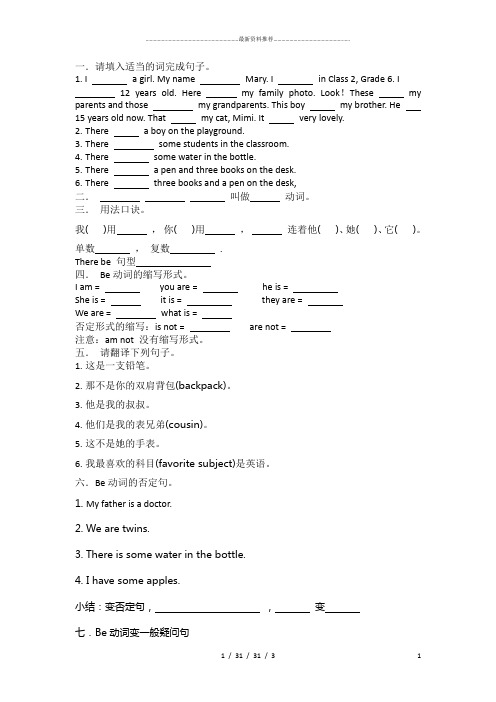
一.请填入适当的词完成句子。
1. I a girl. My name Mary. I in Class 2, Grade 6. I12 years old. Here my family photo. Look!These my parents and those my grandparents. This boy my brother. He15 years old now. That my cat, Mimi. It very lovely.2.There a boy on the playground.3.There some students in the classroom.4.There some water in the bottle.5.There a pen and three books on the desk.6.There three books and a pen on the desk,二.叫做动词。
三.用法口诀。
我( )用,你( )用,连着他( )、她( )、它( )。
单数,复数.There be 句型四.Be动词的缩写形式。
I am = you are = he is =She is = it is = they are =We are = what is =否定形式的缩写:is not = are not =注意:am not 没有缩写形式。
五.请翻译下列句子。
1.这是一支铅笔。
2.那不是你的双肩背包(backpack)。
3.他是我的叔叔。
4.他们是我的表兄弟(cousin)。
5.这不是她的手表。
6.我最喜欢的科目(favorite subject)是英语。
六.Be动词的否定句。
1.My father is a doctor.2.We are twins.3.There is some water in the bottle.4. I have some apples.小结:变否定句,,变七.Be动词变一般疑问句变一般疑问句,并作肯定回答和否定回答1.I am Bob.2.This is my mother.3.Those are his books.4.These are her parents.5.There are some children in the park.小结:变一般疑问句,将提到句首,变,变八.Exercise(一)用be动词( )的正确形式填空。
浅谈英语动词适当形式填空题解法
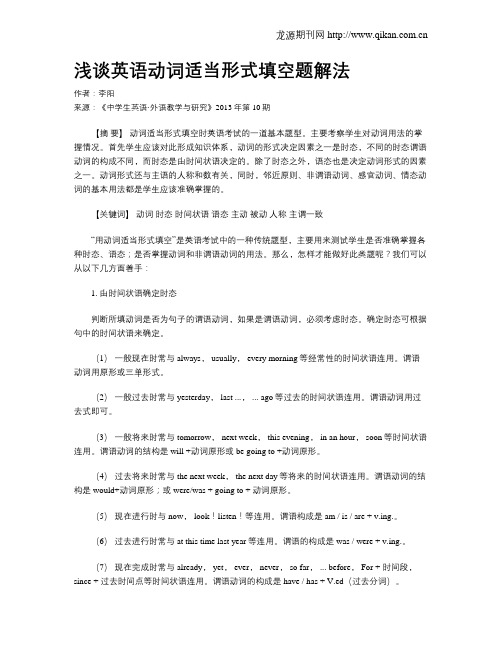
浅谈英语动词适当形式填空题解法作者:李阳来源:《中学生英语·外语教学与研究》2013年第10期【摘要】动词适当形式填空时英语考试的一道基本题型。
主要考察学生对动词用法的掌握情况。
首先学生应该对此形成知识体系,动词的形式决定因素之一是时态,不同的时态谓语动词的构成不同,而时态是由时间状语决定的。
除了时态之外,语态也是决定动词形式的因素之一。
动词形式还与主语的人称和数有关,同时,邻近原则、非谓语动词、感官动词、情态动词的基本用法都是学生应该准确掌握的。
【关键词】动词时态时间状语语态主动被动人称主谓一致“用动词适当形式填空”是英语考试中的一种传统题型,主要用来测试学生是否准确掌握各种时态、语态;是否掌握动词和非谓语动词的用法。
那么,怎样才能做好此类题呢?我们可以从以下几方面着手:1. 由时间状语确定时态判断所填动词是否为句子的谓语动词,如果是谓语动词,必须考虑时态。
确定时态可根据句中的时间状语来确定。
(1)一般现在时常与always, usually, every morning等经常性的时间状语连用。
谓语动词用原形或三单形式。
(2)一般过去时常与 yesterday, last ..., ... ago等过去的时间状语连用。
谓语动词用过去式即可。
(3)一般将来时常与tomorrow, next week, this evening, in an hour, soon等时间状语连用。
谓语动词的结构是will +动词原形或be going to +动词原形。
(4)过去将来时常与the next week, the next day等将来的时间状语连用。
谓语动词的结构是would+动词原形;或were/was + going to + 动词原形。
(5)现在进行时与now, look!listen!等连用。
谓语构成是am / is / are + v.ing.。
(6)过去进行时常与 at this time last year等连用。
2023年人教版英语中考语篇填空中动词适当形式变换规则课件

补充:现在分词与动名词变化规则
1. 一般情况下,在动词原形后直接加-ing 例如: walk→walking
laugh→laughing
2. 以不发音的字母e结尾的动词去e, 再加-ing write→writing move→moving
例如:That made me_____fe__e_l ___(feel) very happy.
温馨提示
在被动语态中,使役动词后需加to.
例如:make sb. do sth.让某人做某事 (主动语态) sb. be made to do sth.某人被迫做某事 (被动语态)
Hale Waihona Puke 有关使役动词被动语态结构的考点: I am made________t_o__learn to sing.
4.位于形容词或形容词性物主代词之后
例:他们说昨天这有一场精彩的演讲。 They said there was a wonderful
s(pspeeachk) yesterday.
特殊补充
“动词变名词”的常见规则如下:
①动词+-er(-or/-r)
常考单词: drive→driver work→worker
例如:to为介词的考法 He is used to_________g_e_t(tginetg) up early.
2.情态动词及其否定形式+动词原形
例如:I can study hard and______g__o___ (go) to a good school.
3.助动词(do/does/did/will)及其 否定形式+动词原形
小学五年级英语---用动词适当形式填空

小学五年级英语---用动词适当形式填空一、考到现在进行时的情况注意:1、看句子有没有now, listen, look等关键词2、看句子前面有没有be动词例题1:(1)He is ____ (watch TV) with his parents now.(2)Are they ____ ( read ) books?(3)The bus is ____ (come).注意,很多句子没有关键词的,那要思考下这个动作是什么时候发生。
如果是现在正在发生,那就要用be +动词ing。
最坑爹题:有些句子用到now,但却不能用现在进行时,因为不是表示正在发生的动作,而是表示现在的状态而已。
例题2:(4)He _____ (have) a lot of money now.(5)Liming _____ (not have) a pen now.二、考到一般现在时的情况注意:1、判断句中有没有usually,often,never,every...等关键词2、要注意主语是不是三单主语,主三单,动三单3、有助动词的情况下,后面动词现原形例题3:(6)He usually _____ (go) to school on foot.(7)Does he often _____ ( go ) _____(swim) on Sundays?(8)Jiaming _____ (not play) football after school everyday.(9)He picks it up and _____(give) it back to me.最坑爹题:有些句子虽然出现在助动词,但孩子们以为助动词后的所有动词都用原形。
例题4:(10)Does she like _____ (go shopping) at the weekend?(11)Don't start _____ ( play ) games before 10:00 am, Daming!三、考到疑问句的情况注意:疑问句到底加be动词,还是助动词,要看句中有没有实义动词。
动词填空高中英文教案模板
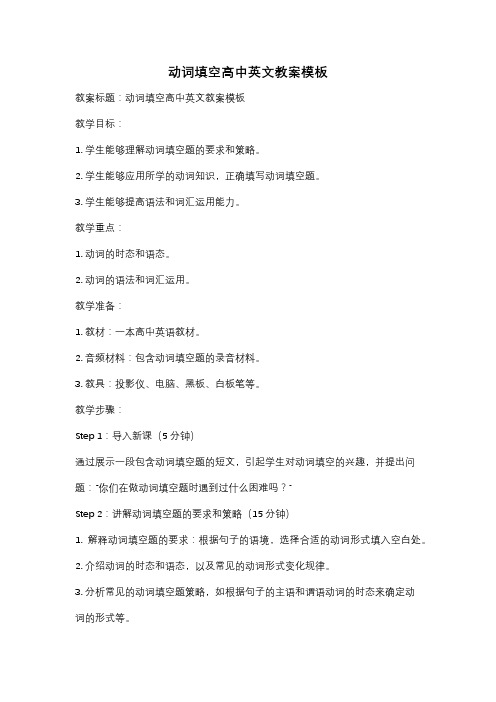
动词填空高中英文教案模板教案标题:动词填空高中英文教案模板教学目标:1. 学生能够理解动词填空题的要求和策略。
2. 学生能够应用所学的动词知识,正确填写动词填空题。
3. 学生能够提高语法和词汇运用能力。
教学重点:1. 动词的时态和语态。
2. 动词的语法和词汇运用。
教学准备:1. 教材:一本高中英语教材。
2. 音频材料:包含动词填空题的录音材料。
3. 教具:投影仪、电脑、黑板、白板笔等。
教学步骤:Step 1:导入新课(5分钟)通过展示一段包含动词填空题的短文,引起学生对动词填空的兴趣,并提出问题:“你们在做动词填空题时遇到过什么困难吗?”Step 2:讲解动词填空题的要求和策略(15分钟)1. 解释动词填空题的要求:根据句子的语境,选择合适的动词形式填入空白处。
2. 介绍动词的时态和语态,以及常见的动词形式变化规律。
3. 分析常见的动词填空题策略,如根据句子的主语和谓语动词的时态来确定动词的形式等。
Step 3:示范和练习(20分钟)1. 播放包含动词填空题的录音材料,让学生跟读并填写答案。
2. 选择一些学生上台展示他们的答案,并进行讨论和纠正。
Step 4:巩固和拓展(15分钟)1. 分组活动:将学生分成小组,给每组发放一份包含动词填空题的练习题,要求他们合作完成,并在规定时间内提交答案。
2. 检查答案并进行讨论,鼓励学生互相学习和交流。
Step 5:作业布置(5分钟)布置相关的课后作业,包括练习题和阅读材料,以巩固学生对动词填空的掌握。
Step 6:课堂总结(5分钟)对本节课的重点内容进行总结,并提醒学生在课后复习和巩固所学知识。
教学扩展:1. 鼓励学生多做动词填空题,提高对动词的敏感度和灵活运用能力。
2. 引导学生在阅读和写作中注意动词的正确使用,提高语言表达的准确性和流畅度。
教学评估:1. 在课堂练习和小组活动中观察学生的表现,评估他们对动词填空的掌握程度。
2. 收集学生的作业,检查他们对动词填空的应用能力和语法正确性。
六年级英语用所给动词的适当形式填空教学文案
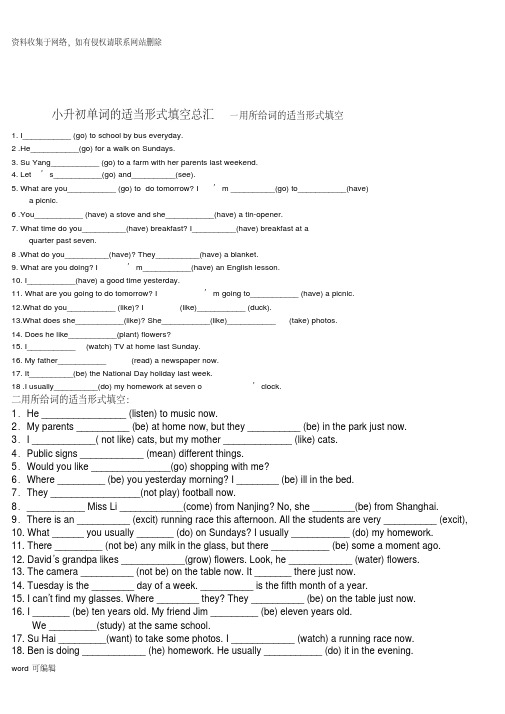
小升初单词的适当形式填空总汇一用所给词的适当形式填空1. I___________ (go) to school by bus everyday.2 .He___________(go) for a walk on Sundays.3. Su Yang___________ (go) to a farm with her parents last weekend.4. Let’s___________(go) and__________(see).5. What are you___________ (go) to do tomorrow? I’m __________(go) to___________(have)a picnic.6 .You___________ (have) a stove and she___________(have) a tin-opener.7. What time do you__________(have) breakfast? I__________(have) breakfast at aquarter past seven.8 .What do you__________(have)? They__________(have) a blanket.9. What are you doing? I’m___________(have) an English lesson.10. I___________(have) a good time yesterday.11. What are you going to do tomorrow? I’m going to___________ (have) a picnic.12.What do you___________ (like)? I (like)___________ (duck).13.What does she___________(like)? She___________(like)___________ (take) photos.14. Does he like___________(plant) flowers?15. I___________ (watch) TV at home last Sunday.16. My father___________ (read) a newspaper now.17. It__________(be) the National Day holiday last week.18 .I usually__________(do) my homework at seven o’clock.二用所给词的适当形式填空:1.He ________________ (listen) to music now.2.My parents __________ (be) at home now, but they __________ (be) in the park just now.3.I ____________( not like) cats, but my mother _____________ (like) cats.4.Public signs ____________ (mean) different things.5.Would you like _______________(go) shopping with me?6.Where _________ (be) you yesterday morning? I ________ (be) ill in the bed.7.They _________________(not play) football now.8.___________ Miss Li ____________(come) from Nanjing? No, she ________(be) from Shanghai. 9.There is an __________ (excit) running race this afternoon. All the students are very __________ (excit),10. What ______ you usually _______ (do) on Sundays? I usually ___________ (do) my homework.11. There _________ (not be) any milk in the glass, but there ___________ (be) some a moment ago.12. David’s grandpa likes ____________(grow) flowers. Look, he ____________ (water) flowers.13. The camera __________ (not be) on the table now. It _______ there just now.14. Tuesday is the ________ day of a week. __________ is the fifth month of a year.15. I can’t find my glasses. Where ________ they? They __________ (be) on the table just now.16. I _______ (be) ten years old. My friend Jim _________ (be) eleven years old.We _________(study) at the same school.17. Su Hai _________(want) to take some photos. I ____________ (watch) a running race now.18. Ben is doing ____________ (he) homework. He usually ___________ (do) it in the evening.19. Where __________ (be) he just now? I don’t know.20. Today is the __________ (four) of January.三用所给词的适当形式填空:1.What _________ you _________ last week? I __________ (visit) a farm.2.What __________ you _________ now? I ___________(clean) the house.3.What _________ they usually do on Sundays? They _________ football .4.Mike _________(like) collecting coins, but Nancy __________(not like) collecting coins,5._________ (be) you at home yesterday? No, I ___________.6.__________ your brother go shopping last night? No, he __________(do) his homework at home.7.Look! They _______________( have) an English lesson in the classroom.8.Mike and his father ____________( taste) some oranges a moment ago.9.Would you like ______________(watch) cartoons now?10.My mother can’t __________(find) her glasses. They _________(be) in her bag just now.11.I __________ (not meet) Nancy just now. Listen, she ___________(sing) over there.12.Do you like ____________( picture)? No, I __________. I like ___________(doll).13.She shouldn’t _________(go) to the zoo now, she must __________(stay) at home.14.We want ___________(play) a game at the party.15.Ben ___________(watch) a film last weekend.16.Did you ____________(pick) oranges on the farm?17.What did you do on Sunday? I __________(water) flowers.18.The boy ____________(not pull) up carrots just now, he _________(cook) food.19.Were there any books on the desk? No, they ___________.20.I can __________(get) up early. I __________(do) morning exercise at six.21.She likes ___________(dance). She can dance very _________(good).22.What _______ he doing? He is __________(draw) pictures.23.________ your birthday in June? No, it’s on the ________(five) of April.24.Where _________ (be) you just now? I _______(clean) my bedroom.四用be动词的适当形式填空。
用所给动词的适当形式填空专题评课稿

用所给动词的适当形式填空专题评课稿
本节课是关于动词形式的填空题专题,目的是让孩子们掌握动词的不同形式,提高语法运用能力。
现在我将对这节课做一个评课稿。
首先,我认为这节课的教学目标明确,能够帮助学生掌握动词的不同形式,提高语法运用能力。
通过填空题形式,使学生在实践中学习和运用动词的不同形式,对学生语言能力的提高有很大帮助。
其次,教学内容贴近学生生活,选取了与学生经常接触并使用的动词,这样能够增加学生的兴趣,使学习更有针对性和实用性。
同时,填空题的形式也是学生较为熟悉的形式,有利于学生更好地理解和运用动词的不同形式。
然后,教学过程设计合理,通过引导让学生思考并且运用所学的知识填空,培养了学生的逻辑思维能力和创造力。
同时,教师在教学过程中及时发现学生的问题,并给予指导和帮助,提高了学生对动词形式的理解和运用。
最后,教学反馈及时有效。
在课堂结束前,教师给学生一些类似的练习题目,让学生检验并巩固所学的知识,能够及时了解学生的学习情况,并且及时给予帮助和指导。
总之,本节课形式新颖,内容贴合学生实际,教学过程设计合理,教学反馈及时有效,能够提高学生对动词形式的掌握和应
用能力。
希望在今后的教学中,能够更加注重培养学生的语法运用能力,提高语言表达的准确性和流畅性。
六年级下册英语期末复习-动词适当形式填空讲解及训练-教科版(含答案)
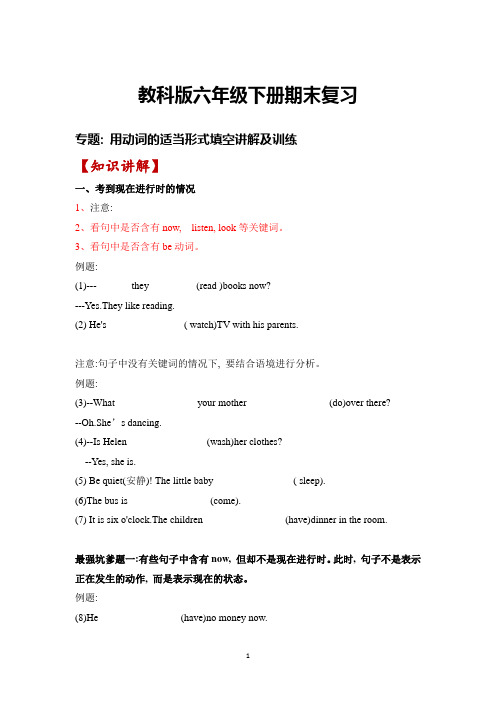
教科版六年级下册期末复习专题: 用动词的适当形式填空讲解及训练【知识讲解】一、考到现在进行时的情况1、注意:2、看句中是否含有now, listen, look等关键词。
3、看句中是否含有be动词。
例题:(1)---_______they_________ (read )books now?---Yes.They like reading.(2) He's_______________ ( watch)TV with his parents.注意:句子中没有关键词的情况下, 要结合语境进行分析。
例题:(3)--What________________ your mother________________ (do)over there?--Oh.She’s dancing.(4)--Is Helen________________(wash)her clothes?--Yes, she is.(5) Be quiet(安静)! The little baby________________( sleep).(6)The bus is________________ (come).(7) It is six o'clock.The children________________ (have)dinner in the room.最强坑爹题一:有些句子中含有now, 但却不是现在进行时。
此时, 句子不是表示正在发生的动作, 而是表示现在的状态。
例题:(8)He________________ (have)no money now.(9) Now I________________ ( love)my life in Guangzhou.(10) She________________ (be )a teacher now.(11)________________ (be)there a book on the desk now?二、考到一般现在时的情况注意:判断句中是否含有usually, often, never, every等关键词。
小学一年级下册语文填空教案
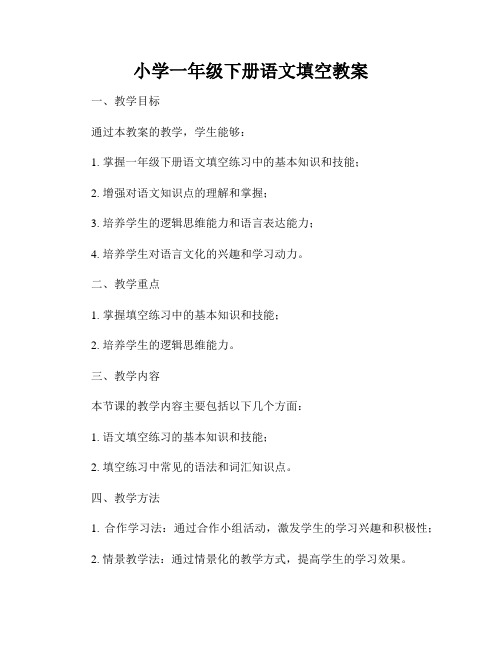
小学一年级下册语文填空教案一、教学目标通过本教案的教学,学生能够:1. 掌握一年级下册语文填空练习中的基本知识和技能;2. 增强对语文知识点的理解和掌握;3. 培养学生的逻辑思维能力和语言表达能力;4. 培养学生对语言文化的兴趣和学习动力。
二、教学重点1. 掌握填空练习中的基本知识和技能;2. 培养学生的逻辑思维能力。
三、教学内容本节课的教学内容主要包括以下几个方面:1. 语文填空练习的基本知识和技能;2. 填空练习中常见的语法和词汇知识点。
四、教学方法1. 合作学习法:通过合作小组活动,激发学生的学习兴趣和积极性;2. 情景教学法:通过情景化的教学方式,提高学生的学习效果。
五、教学步骤1. 导入(5分钟)通过展示一些填空练习的题目,引起学生对填空练习的兴趣,激发他们的学习欲望。
2. 提出问题(10分钟)根据学生的实际情况,提出一些填空练习中常见的问题,如:“你是怎样填空的?”、“你有什么困难?”、“你有什么好的方法?”等等。
鼓励学生积极回答,并对他们的回答给予肯定和鼓励。
3. 学习填空技巧(15分钟)根据学生提出的问题,向他们介绍一些填空练习的技巧。
如:“先找出句子的主语和谓语动词”、“根据上下文选择适当的词语填空”、“注意时态和语法规则”等。
并通过示例演示,帮助学生理解并掌握这些填空技巧。
4. 合作学习(20分钟)将学生分成小组,让他们互相合作,共同完成一些填空练习。
教师可以提供不同难度的题目,根据学生的实际水平进行分配。
在合作学习的过程中,教师可以轮流巡回指导,及时纠正学生的错误,帮助他们解决问题。
5. 综合练习(15分钟)让学生个人或小组完成一套综合性的填空练习,检验他们对所学知识的掌握情况。
教师可以根据学生的表现进行及时的反馈和指导。
六、巩固和拓展(5分钟)在课堂结束前,教师可以向学生布置一些课后作业或拓展练习,以巩固和深化所学知识。
七、教学反思通过本节课的教学,学生能够主动参与到填空练习中,积极思考和合作。
英语动词填空教案
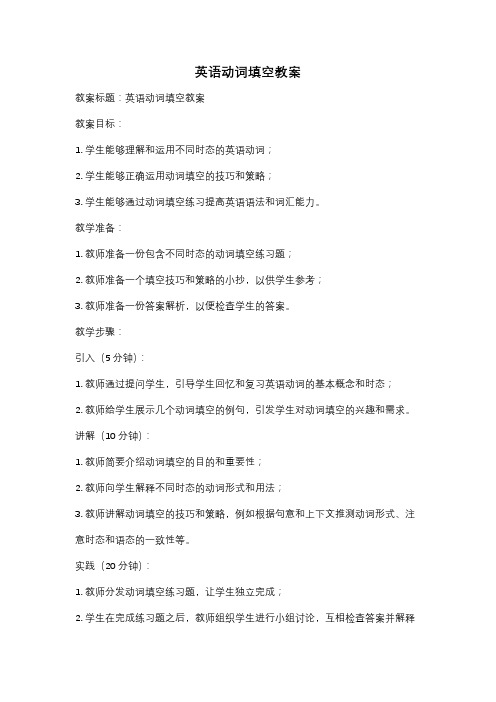
英语动词填空教案教案标题:英语动词填空教案教案目标:1. 学生能够理解和运用不同时态的英语动词;2. 学生能够正确运用动词填空的技巧和策略;3. 学生能够通过动词填空练习提高英语语法和词汇能力。
教学准备:1. 教师准备一份包含不同时态的动词填空练习题;2. 教师准备一个填空技巧和策略的小抄,以供学生参考;3. 教师准备一份答案解析,以便检查学生的答案。
教学步骤:引入(5分钟):1. 教师通过提问学生,引导学生回忆和复习英语动词的基本概念和时态;2. 教师给学生展示几个动词填空的例句,引发学生对动词填空的兴趣和需求。
讲解(10分钟):1. 教师简要介绍动词填空的目的和重要性;2. 教师向学生解释不同时态的动词形式和用法;3. 教师讲解动词填空的技巧和策略,例如根据句意和上下文推测动词形式、注意时态和语态的一致性等。
实践(20分钟):1. 教师分发动词填空练习题,让学生独立完成;2. 学生在完成练习题之后,教师组织学生进行小组讨论,互相检查答案并解释自己的选择;3. 教师在学生完成讨论之后,展示答案解析,让学生核对自己的答案。
巩固(10分钟):1. 教师组织学生进行口头练习,要求学生根据给定的句子,用正确的动词形式填空;2. 学生之间进行互动,互相检查和纠正错误;3. 教师对学生的表现进行评价和反馈,鼓励学生继续努力。
拓展(5分钟):1. 教师提供一些额外的动词填空练习题,供学生在课后继续练习;2. 教师建议学生使用在线资源或应用程序来进一步提高动词填空的能力;3. 教师鼓励学生在日常学习中多加练习和应用动词填空的技巧。
教学反思:1. 教师在教学过程中要及时观察学生的学习情况,确保每个学生都能够跟上教学进度;2. 教师要鼓励学生积极参与讨论和互动,提高学生的学习兴趣和动力;3. 教师要及时给予学生反馈和指导,帮助他们纠正错误和提高学习效果。
动词的用法教案
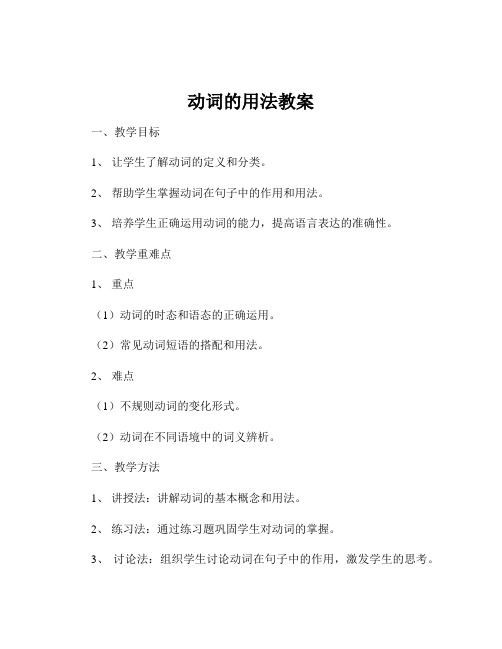
动词的用法教案一、教学目标1、让学生了解动词的定义和分类。
2、帮助学生掌握动词在句子中的作用和用法。
3、培养学生正确运用动词的能力,提高语言表达的准确性。
二、教学重难点1、重点(1)动词的时态和语态的正确运用。
(2)常见动词短语的搭配和用法。
2、难点(1)不规则动词的变化形式。
(2)动词在不同语境中的词义辨析。
三、教学方法1、讲授法:讲解动词的基本概念和用法。
2、练习法:通过练习题巩固学生对动词的掌握。
3、讨论法:组织学生讨论动词在句子中的作用,激发学生的思考。
四、教学过程1、导入通过展示一些包含动词的句子,如“小明跑步很快”“她正在唱歌”“我昨天买了一本书”,引导学生注意句子中的动词,从而引出本节课的主题——动词的用法。
2、知识讲解(1)动词的定义:动词是表示动作、行为、心理活动或存在、变化、消失等意义的词。
例如:跑、跳、想、爱、存在、消失等。
(2)动词的分类按动作的性质分:实义动词:表示具体的动作,如“跑、跳、写”等。
系动词:用于连接主语和表语,表示主语的状态、特征等,如“是、看起来、变得”等。
助动词:协助主要动词构成各种时态、语态、语气等,如“do、does、did、have、has、had”等。
情态动词:表示说话人的语气、态度或推测等,如“can、could、may、might、must”等。
按动作的时间分:一般现在时:表示经常发生的动作或存在的状态,如“我每天早上起床很早”。
一般过去时:表示过去发生的动作或存在的状态,如“他昨天去了北京”。
一般将来时:表示将来要发生的动作或存在的状态,如“明天我们将去公园”。
现在进行时:表示正在进行的动作,如“她正在看电视”。
过去进行时:表示过去某个时刻正在进行的动作,如“昨天这个时候我正在做作业”。
现在完成时:表示过去发生的动作对现在造成的影响或结果,如“我已经完成了作业”。
过去完成时:表示过去某个时间之前已经完成的动作,如“到去年年底,我已经学了三年英语”。
语法填空教案

语法填空教案一、教学目标1. 确定学生已掌握的语法知识,即填空技巧和常见的语法规则。
2. 提高学生的语法填空能力,包括准确辨别句子结构、选用正确的词类和使用适当的语法规则。
3. 培养学生的自主学习能力,通过课堂练习和课后作业的反馈,不断改进自己的学习方法和策略。
二、教学重点和难点1. 教学重点:培养学生的语法填空能力。
2. 教学难点:辨别语法填空句子的结构,选择正确的词类和使用适当的语法规则。
三、教学过程1. 导入将一篇语法填空练习文章给学生,要求他们在5分钟内填好尽可能多的空格。
然后,让学生自己根据填空经历和答案讲解填空的技巧和策略。
2. 提高填空能力让学生在书写一些句子,利用已学的语法知识填写句子中的空格。
教师引导学生注意各种语法要素,比如动词时态、词性和句子结构等。
3. 拓展练习教师给学生一篇新的语法填空文章,要求他们在限定的时间内填好空格。
然后,学生互相检查,用不同颜色的笔在上面做标记,并找出自己填错的地方。
4. 归纳总结教师带领学生整理、总结填空经验和策略,并列出一些填空技巧和语法规则供学生参考。
5. 练习检测教师给学生一篇语法填空练习,要求他们在限定的时间内填好,并交给教师检查。
6. 课堂反思教师和学生一起讨论课堂的教学效果,分析学生的问题和需要进一步改进的地方。
四、教学资源1. 语法填空练习文章2. 笔、纸和彩色笔五、作业布置要求学生完成一篇语法填空作业,并按照课堂上讲解的填空技巧和策略进行填写,并交给教师检查。
六、教学反思本节课通过讲解语法填空技巧和策略,培养了学生的语法填空能力,并提高了他们的自主学习能力。
课堂练习和课后作业的反馈,对学生的进一步改进提供了指导。
然而,由于限制了字数的要求,文章无法详细展开每一部分内容。
因此,请同学们根据题目提供的提示,自行推理填空内容,并根据自己的理解和掌握选择合适的语法知识进行填写。
动词填空教案
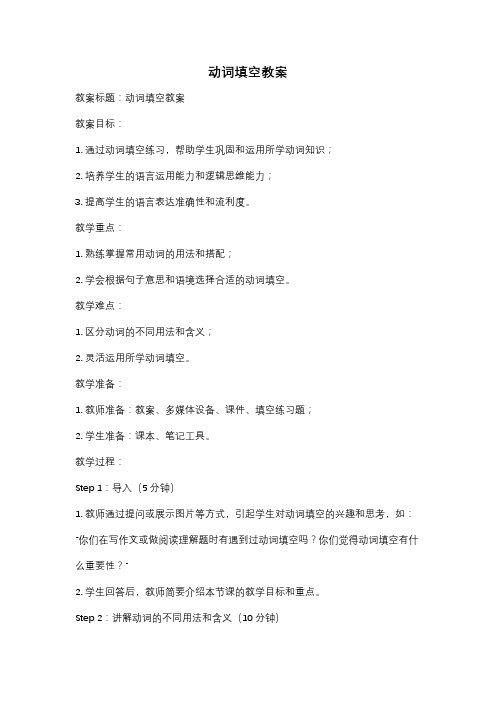
动词填空教案教案标题:动词填空教案教案目标:1. 通过动词填空练习,帮助学生巩固和运用所学动词知识;2. 培养学生的语言运用能力和逻辑思维能力;3. 提高学生的语言表达准确性和流利度。
教学重点:1. 熟练掌握常用动词的用法和搭配;2. 学会根据句子意思和语境选择合适的动词填空。
教学难点:1. 区分动词的不同用法和含义;2. 灵活运用所学动词填空。
教学准备:1. 教师准备:教案、多媒体设备、课件、填空练习题;2. 学生准备:课本、笔记工具。
教学过程:Step 1:导入(5分钟)1. 教师通过提问或展示图片等方式,引起学生对动词填空的兴趣和思考,如:“你们在写作文或做阅读理解题时有遇到过动词填空吗?你们觉得动词填空有什么重要性?”2. 学生回答后,教师简要介绍本节课的教学目标和重点。
Step 2:讲解动词的不同用法和含义(10分钟)1. 教师通过多媒体设备展示动词的定义和不同用法,如及物动词、不及物动词、及物动词的宾语等。
2. 教师讲解常用动词的用法和搭配,引导学生理解动词的含义和用法。
3. 教师通过示例句子和语境,让学生感受动词在句子中的作用和重要性。
Step 3:练习动词填空(20分钟)1. 教师提供一些动词填空的练习题,包括单句填空和短文填空。
2. 学生根据句子意思和语境,选择合适的动词填空,并在答题纸上完成填空练习。
3. 学生完成后,教师进行答案讲解和讨论,解释每个填空的原因和依据。
Step 4:巩固和拓展(15分钟)1. 教师组织学生进行小组讨论,让学生分享自己在填空练习中遇到的问题和解决方法。
2. 教师提供一些拓展练习题,要求学生在限定时间内完成,并进行答案讲解和讨论。
3. 教师根据学生的表现,给予肯定和鼓励,并提供一些建议和指导。
Step 5:总结和反思(5分钟)1. 教师和学生共同总结本节课所学的内容和重点,强调动词填空的重要性和运用技巧。
2. 学生进行个人反思,思考自己在本节课中的收获和不足之处,并提出问题和建议。
用所给动词的适当形式填空专题评课稿

用所给动词的适当形式填空专题评课稿开篇近年来,"用所给动词的适当形式填空"这一教学方法备受关注。
作为一种形式多样,能激发学生思维和培养语法运用能力的教学手段,它在语文教学中有着独特的价值。
本文将对这一主题进行全面评估,并深入探讨其在课堂中的应用和意义。
一、"用所给动词的适当形式填空"的基本概念在语文教学中,"用所给动词的适当形式填空"是指给出一个句子,要求学生根据上下文语境,选择合适的动词形式填入空白处。
这种教学方法要求学生准确理解句子的含义和结构,灵活运用所学的语法知识,培养学生的语感和语法意识。
在这一过程中,学生既能加深对动词时态、语态和语气的理解,又能提高语言表达的准确性和流畅度。
二、"用所给动词的适当形式填空"的教学价值1. 激发学生的学习兴趣"用所给动词的适当形式填空"是一种形式多样的教学形式,能够激发学生的学习兴趣。
通过填空练习,学生能够在实际运用中感受语法知识的实用性,增加对语言学习的自信心,积极参与课堂教学。
2. 培养语法运用能力这种教学方法要求学生在句子的语境中选择适当的动词形式,需要学生准确理解句子的语义和结构。
通过不断练习,学生能够加深对动词时态、语态和语气的认识,培养语言运用的准确性和灵活性。
3. 提高语言表达能力"用所给动词的适当形式填空"能够让学生在实际运用中不断巩固语法知识,提高语言表达的准确性和流畅度。
通过填空练习,学生不断积累语言素材,提高语言表达的能力。
三、"用所给动词的适当形式填空"在课堂中的应用在语文教学中,教师可以通过设计各种形式的填空练习来引导学生运用所学的语法知识。
在教学过程中,教师可以设计句子填空练习,要求学生根据上下文选择合适的动词形式,或者设计篇章填空练习,要求学生在阅读理解的基础上进行适当的语法运用。
在填空练习的过程中,教师应该充分发挥学生的主体性和积极性,引导他们在填空的过程中不断思考、总结,并逐步提高语法知识的掌握程度。
教案模板选词填空
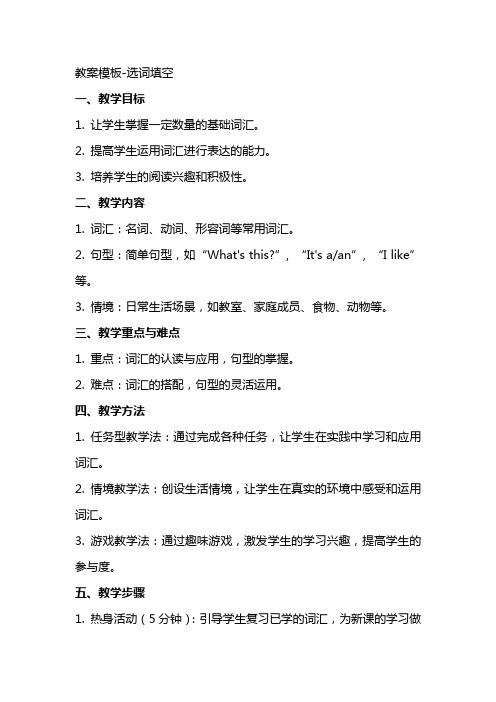
教案模板-选词填空一、教学目标1. 让学生掌握一定数量的基础词汇。
2. 提高学生运用词汇进行表达的能力。
3. 培养学生的阅读兴趣和积极性。
二、教学内容1. 词汇:名词、动词、形容词等常用词汇。
2. 句型:简单句型,如“What's this?”, “It's a/an”, “I like”等。
3. 情境:日常生活场景,如教室、家庭成员、食物、动物等。
三、教学重点与难点1. 重点:词汇的认读与应用,句型的掌握。
2. 难点:词汇的搭配,句型的灵活运用。
四、教学方法1. 任务型教学法:通过完成各种任务,让学生在实践中学习和应用词汇。
2. 情境教学法:创设生活情境,让学生在真实的环境中感受和运用词汇。
3. 游戏教学法:通过趣味游戏,激发学生的学习兴趣,提高学生的参与度。
五、教学步骤1. 热身活动(5分钟):引导学生复习已学的词汇,为新课的学习做好铺垫。
2. 引入新词汇(10分钟):展示新词汇的图片,引导学生猜测词汇意义,并进行认读练习。
3. 句型练习(10分钟):利用新学的词汇,进行简单的句型练习,如“What's this?”, “It's a/an”, “I like”等。
4. 小组活动(10分钟):学生分组,进行选词填空的游戏,巩固所学词汇和句型。
5. 总结与作业布置(5分钟):对本节课的学习内容进行总结,布置相关的作业,巩固所学知识。
教学反思:在课后,对教学效果进行反思,看是否达到了预期的教学目标,学生对新词汇的掌握情况如何,哪些地方需要改进等。
根据学生的反馈,调整教学策略,为下一节课的教学做好准备。
六、教学评价1. 课堂参与度:观察学生在课堂活动中的积极参与情况,以及他们在小组活动中的合作表现。
2. 词汇掌握程度:通过课后作业和课堂练习,评估学生对新词汇的认读和应用能力。
3. 句型应用能力:通过课堂问答和小组活动,评估学生对新句型的理解和运用情况。
七、课后作业1. 抄写新学的词汇,并进行翻译练习。
语法填空教学设计

语法填空教学设计一、教学目标:让学生了解语法填空题考察内容;让学生掌握语法填空题解题技巧;让学生注意平常对词汇的积累,大量阅读课外材料,培养词感和语感,加强基本功;并注意生活常识的积累。
二、教学重点:总结语法填空题的常考点及解题技巧,掌握分析句子的微技能三、教学难点:学生掌握语法填空题的解题技巧四、教学过程Step1: Lead-in( 导入)让学生了解并掌握语法填空题到底是考察什么内容以及怎样做这一类题。
Step2: 语法填空题考察内容和解题思路考察内容:语法填空以要求根据上下文填入一个以动词(verb)(或其适当形式)、名词(noun)、代词(pronoun)、冠词(article)、介词(prep.)、情态动词(modal verbs)、连词(conj)或引导词、形容词(adj.)和副词(adv.) 考查各项语法内容Step3:三个解题思路:①纯空格试题:一般考察冠词,连词,代词和介词②给出了动词的试题:谓语动词和非谓语动词(前者要考虑时态和语态以及主谓一致;后者主要是to do, doing,done及变形)③词类转换题(单词的积累,词汇量以及构词法)Step:4: 案例分析讲解与练习1.纯空格题型的解题技巧:(1)冠词或代词名词前面若没有限定词(定冠词,不定冠词,形容词性物主代词,不定代词),很可能考查限定词。
若句子缺主语或宾语,很可能考查代词。
(Exercise)(2)介词介词的基本用法及惯用搭配介词的使用要注意固定搭配和熟知常见的介词(Exercise)(3)连词考点归纳: 同一个主语发出两个或几个动作,且时态一致,中间没有连词,一定是填连词。
(Exercise)(4)从句引导词①定语从句---关系代词考点归纳:定语从句中缺主语,宾语,表语或定语,一定是填适当的关系代词,如:who, that, which, whom,whose , as (Exercise)定语从句---关系副词考点归纳:定语从句中缺地点状语用________, 缺时间状语用_________________,缺原因状语用____________。
用动词的适当形式填空知识讲解

用动词的适当形式填空用动词的适当形式填空:1.John ________(go) to school by bike every day.2.Kate often __________(play) table tennis with her friends after school .3.My mother usually ________(go) shopping and ________(buy) some vegetables .4. He often ________(have) dinner at home.5. Daniel and Tommy _______(be) in Class One.6. The girl _______(teach) us English on Sundays.7. She and I ________(take) a walk together every evening.8.. Mike _______(like) cooking.9. You always _______(do) your homework well.10. -What day _______(be) it today? -It’s Saturday.(四)一般现在时的各种句式变化根据中文造句子。
(1)我是一位学生。
我不是一位学生。
你是一位学生?(2)她喜欢看电视。
她不喜欢看电视。
她喜欢看电视吗?你发现了吗?以上两组句子中的主语和动词分别是?变为否定句和疑问句时它们发生了什么变化呢?归纳:(1)含有be 动词的一般现在时的句式:❖主语 + be(am, is, are) + 其它(肯定句):I am from Shanghai.(否定句):I am not from Shanghai.(一般疑问句):Are you from Shanghai?(肯定回答):Yes, I am.(否定回答):No, I’m not.有be动词,变疑问,Be提前,句末问号别忘记。
《恰当地运用动词》教学设计
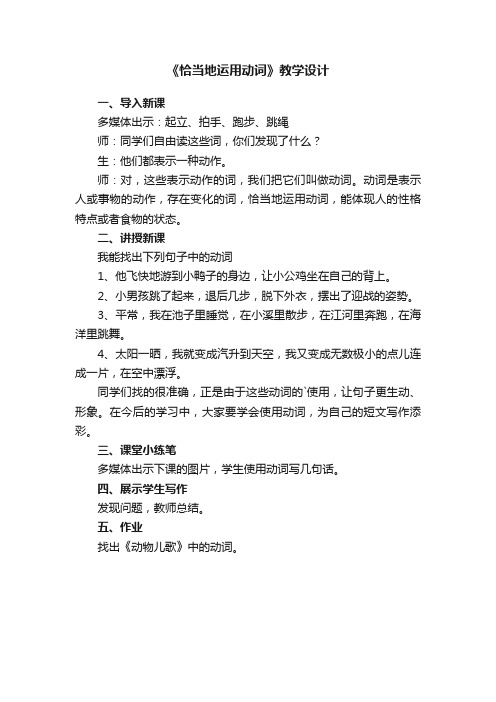
《恰当地运用动词》教学设计
一、导入新课
多媒体出示:起立、拍手、跑步、跳绳
师:同学们自由读这些词,你们发现了什么?
生:他们都表示一种动作。
师:对,这些表示动作的词,我们把它们叫做动词。
动词是表示人或事物的动作,存在变化的词,恰当地运用动词,能体现人的性格特点或者食物的状态。
二、讲授新课
我能找出下列句子中的动词
1、他飞快地游到小鸭子的身边,让小公鸡坐在自己的背上。
2、小男孩跳了起来,退后几步,脱下外衣,摆出了迎战的姿势。
3、平常,我在池子里睡觉,在小溪里散步,在江河里奔跑,在海洋里跳舞。
4、太阳一晒,我就变成汽升到天空,我又变成无数极小的点儿连成一片,在空中漂浮。
同学们找的很准确,正是由于这些动词的`使用,让句子更生动、形象。
在今后的学习中,大家要学会使用动词,为自己的短文写作添彩。
三、课堂小练笔
多媒体出示下课的图片,学生使用动词写几句话。
四、展示学生写作
发现问题,教师总结。
五、作业
找出《动物儿歌》中的动词。
- 1、下载文档前请自行甄别文档内容的完整性,平台不提供额外的编辑、内容补充、找答案等附加服务。
- 2、"仅部分预览"的文档,不可在线预览部分如存在完整性等问题,可反馈申请退款(可完整预览的文档不适用该条件!)。
- 3、如文档侵犯您的权益,请联系客服反馈,我们会尽快为您处理(人工客服工作时间:9:00-18:30)。
动词适当形式填空动词练习题用所给动词的正确形式填空:1. Li Ping often __________ (read) English in the morning.2. __________ he __________ (clean) the windows once a week.3. The workers __________ (have) sports on the playground now.4. How long __________ you __________ (stay) there the day before yesterday.5. Who __________ (listen) to the music?6. When I __________ (be) a middle school student, I often __________ (sing).7. His parents __________(go) to the Great Wall tomorrow morning.8. __________ they __________ (study) Japanese next term?9. What time __________ you __________ (do) your homework everyday.10. Look! The students __________ (clean) the classroom.11. What _________ your after _________ (do) yesterday?He _________ (write) two letters.12. There __________ (be) a football match on TV this evening.13. My father __________ (leave) for Japan tomorrow morning.14. Tom __________ (not listen) to the radio every morning.15. __________ (be) there any hospitals here twenty years ago?16. I __________ (come) to see you again before long.17. __________ there __________ (be) an English evening next Saturday?18. __________ your uncle __________ (have) a meeting last Friday?19. What __________ the young Pioneers __________ (do) on the hill now?20. They __________ (not go) fishing on Sunday.21. How many classes __________ you __________ (have) every day.22. It’s seven in the evening, Tom’s family __________ (watch) TV.23. He __________ (join) the army in 1985. He __________ (be) still in the army how.24. I __________ (visit) my friend next Sunday.25. If it snows tomorrow, we __________ (play) with snow.26. I __________ (make) a lot of mistakes in my test yesterday.27. __________ it __________ (snow) outside now? —No, it __________.28. Where __________ they __________ (live)? They __________ (live) in Shanghai.29. If it __________ (rain) this morning, we won’t go shopping.30. Listen! Who _________(sing)in the next room?31. The teacher _________(not teach)us a Chinese song,he ________(teach)us an English song two days ago.32. If I am free this evening,I ________(help)you with your maths.33. ________you ________(be)there tomorrow? No,I ________.34. Where _________(be)your parents last year? They ________(be)in Xi’an.35. Why _______ they _______(go)to the library after school yesterday? Because they _________(want)to borrow some books.36. What _______ you _______(do)these days?37. Don’t make a noise. Grandma _________(sleep).38. Sometimes he _________(help)his mother with the housework.39. Please write to us as soon as you _________(get)there.40. We ________(show)the foreign friends around Beijing when they get here.41. We’ll wait till you _______(make)up your mind.42. They ______ just _______(talk)about you.43. Where _____he ______(be)? He _________(be)to the bank.44. ______ you______(visit)the Science Museum? ---Yes,I________.45. ______she ______(tell)you the good news? ---No,she _______.46. How long _______ your mother _______(teach)English in this school? ---For ten years.47. We _______ already _______(draw)five pictures.48. My grandson ______________(be)ill for a week.49. ________ the train _________(arrive)?---No,not yet.50. Our physics teacher ____________________(not come)to work today,because he is ill.51. My brother ________(make) o many American friends since he went there two years ago.52. She _______(work)in a factory for three years before she went to college.53. Mr. Brown _______________(live)in London for ten years by the end of last month.54. How many English words _________ you _________(learn)by the end of last term?55. ______ they _______(pick)all the apples before the farmer got there?56. I didn’t return the book to the library,because I _________(not finish)reading it.57. The boy said that he ___________(not break)the window.58. Jack said that he ___________ (not go) over his lessons yet.59. John told me that he ___________ (fly) to Japan next Wednesday.60. Did she say when she ___________ (be) back tomorrow?61. The head master said he ___________ (meet) some foreigners at the station soon.62. I wondered if our team ___________ (win) this evening.63. He said he ___________ (not make) the same mistakes again.63. He said he ___________ (not make) the same mistakes again.64. We ___________ (have) a meeting at that time.65. Tom ___________ (not have) breakfast yesterday morning.66. Did he know he ___________ (have) an English lest the next day?67. ___________ your father ___________ (go) to work by bike every day?68. Mr Wang ___________ (teach) us maths since 199069. They will have a trip to the Great Wall if it ___________ (not rain) next Sunday.70. When I got home my grandmother ___________(make)cakes71. I ___________ (give) the note to him as soon as school is over.72. The English song ___________ (teach) now over the radio.73. English ___________ (speak) all over the world.74. The Great Green Wall must ___________ (build) in the world.75. Can the report ___________ (write)in English?76. The mountain will ___________ (cover) with the trees in a few years.77. The young trees must ___________ (tie) to the stick to keep it straight.78. So far, many man-made satellites have ___________ (send) up into space.79. English ___________ (speak) in Canada.80. Tennis ___________ (invent) a hundred years ago.81. It ___________ (snow) hard now. We’d better ___________ (not go) home right now.82. These exercises must ___________ (do) by yourself.83. Our teacher told us time ___________ (be) life.84. We ___________ (not see) each other since he ___________ (leave) here.85. ___________you ever ___________(ride) a horse before?86. Miss Green ___________(be) in China for 6 years.87. We ___________ never ___________ (be) to Hawaii.88. You’d better try to give up ___________ (smoke). It’s too bad to your health.89. Who is doing well in ___________ (describe) things?90. Have you finished ___________ (read) the book?91. Have you saw someone ___________ (ski) before?92. Can a shark stop ___________ (swim)? —No, It can’t93. Y ou’d better try ___________ (do) it by yourself.94. The students kept ___________(talk)about the football match.95. I had a computer lessons first. Then I went on ___________ (have) tennis lessons.96. He hopes ___________ (see) the famous football player as soon as possible.97. The boy kept ___________ (ask) strange questions to his teacher, it made the teacher unhappy.98. Edison enjoyed ___________ (try) his new ideas.99. He asked me ___________ (speak) loudly.100. Students must study hard ___________ (make) our country strong.101. The policeman made him ___________ (stand) in the rain for half an hour.102. Would you like something nice ___________ (eat)103. I can’t decide which sweater ___________ (choose)104. He hasn’t decided whether choose (tell) the truth.105. He told me where ___________ (buy) a computer.106. Will you please ___________ (not talk) in the reading room.107. I have a lot of work ___________ (do).108. Why not ___________ (come) a little earlier? 109. I’m sorry ___________ (hear) that.110. When did you finish ___________ (pack) ?111. ___________ (talk) with her is a great pleasure. 112. English is not so easy ___________ (learn) well.113. When makes him ___________ (think) I am a scientist.114. I forgot ___________ (bring) my textbook with me.115. Last night I heard Mike ___________ (cry) in the room.116. My idea is ___________ (have) a meeting at once.117. At night, the robot watched him _________ (sleep). It knew everything about Mr. Mott.118. In the country, he can hear birds ___________ (sing) and sheep ___________ (bleat)119. My job is ___________ (feed) the animals.120. In about 600 years, we will hardly have enough space _________ (stand) in on the earth.121.Foresthelp to keep water from ___________ (run) away.122. He printer is used for ___________ (print) documents.123. He is busy ___________ (write) his composition. 124. The film is worth ___________ (see).125. They prefer to ___________(stay) at home rather than ___________ (play) basketball.126. Your opinion is worth ___________ (consider). 127. Ed starts ___________ (carry) the bag, but trips over his shoes.128. We are going to have lots of fun _________ (hike) and _________ (eat) a new kind fruit.129. Are you good at ___________ (read) maps?130. Mary heard her father ___________ (say) he would set off the next week.131. Do you enjoy ___________ (live) here?132. My father likes ___________ (read) newspaper in the evening.133. There is nothing ___________ (worry) about. 134. A computer tells the robot what ___________ (do).135. He always tells us how ___________ (learn) English well.136. It took me about an hour ___________ (go) to work by bus.137. The box is too heavy ___________ (carry).138. Cody is a good dog. He likes ___________ (follow) people.139.They want ___________ (take) some fruit with them. 140. My father often tells me ___________ (not swim) in the river because it’s over 4 metres deep.141. A nn had no time ___________ (open) these presents. 142. Let the boy ___________ (do) it by himself.143. When I saw him, he was busy ___________ (read) a new.答案:1. reads2. Does, clean3. are having4. did, stay5. is listening6. was, sang7. will go8. Will, study9. do, do 10. are cleaning11. did, do, wrote 12. will be 13. is leaving 14. doesn’t listen15. Were 16. will come / is coming 17. Will, be 18. Did, have19. are, doing 20. don’t go 21. do, have 22. are watching 23. joined, is24. will visit 25. will play 26. made 27. Is, snowing 28. do, live, live29. rains 30. is singing 31. hasn’t taught 32. will help 33. Will, be34. were, were 35. did, go 36. are, doing 37. is sleeping 38. helps 39. get 40. will show 41. make 42. have talked43. has, been 44. Have, visited, have 45. Has, told, hasn’t 46. have, drawn 48. has been 49. Has, arrived 50. hasn’t come51. has made 52. had worked 53. had lived 54. had, learned 55. Had picked56. hadn’t finished 57. hadn’t 58. hadn’t gone 59. would fly60. would be 61. would meet 62. would win 63. wouldn’t make64. were having 65. didn’t have 66. would have 67. Does, go 68. has taught69. doesn’t rain 70. was making 71. will give 72. will give73. is spoken 74. be built 75. be written 76. be covered77. be tied 78. been sent 79. is spoken 80. was invented 81. is snowing, not go82. be done 83. is 84. haven’t seen, left 85. Have, ridden86. has been 87. have, been 88. smoking 89. describing90. reading 91. ski 92. swimming 93. to do 94. talking95. to have 96. to see 97. asking 98. trying 99. to speak100. to make 101. stand 102 to eat 103. to choose104. to tell 105. to buy 106. not talk 107. to do108. come 109. to hear 110. packing 111. Talking112. to learn 113. think 114. to bring 115. cry116. to have 117. sleep 118. singing 119. to feed120. to stand 121. running 122. printing 123. writing124. seeing 125. stay, play 126. considering 127. to carry128. hiking, eating 129. reading 130. saying 131. living132. reading 133. to worry 134. to do 135. to learn136. to go 137. to carry 138. following 139. to take140. not to swim 141. to open 142. do 143. reading。
